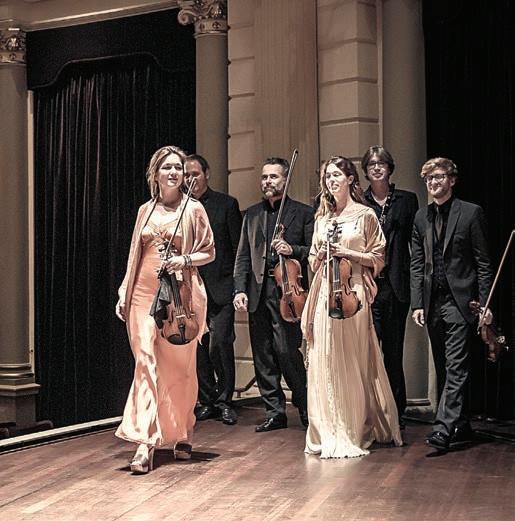
2 minute read
1920s meets 2020s at the Center
THE PLAYERS IN CAMERATA RCO are members of the Dutch Royal Concertgebouw Orchestra (RCO), one of the world’s greatest orchestras. It says a lot about their love of chamber music that they make time in their busy orchestra schedules to be part of this ensemble. They describe it for themselves:
“We are completely free to choose the repertoire we play, where we play it and with whom. We like to be in close contact with our audience. The energy that results from these concerts is what inspires us most.”
That energy translates into great reviews. “The Camerata players… gave a warm, glowing performance of this mellow, often intricate music,” says The New York Times
“They play as one, phrasing, shading dynamics, and even breathing in a unanimous organism,” says Midlandmusicreview.co.uk, which goes on to praise the “suave, elegant finger work from the strings, beautifully balanced in a comforting sound.”
Four of the pieces on the Center’s program are by French composer Francis Poulenc. In the late 1950s Poulenc, who died in 1963, said he doubted anyone would be interested in his music in 50 years. He has been proved wrong. Today, music writer Jessica Duchen describes Poulenc as “a fizzing, bubbling mass of Gallic energy who can move you to both laughter and tears within seconds. His language speaks clearly, directly and humanely to every generation.”
Many of Poulenc’s major compositions were written in the 1920s, the post-World War I period when Europeans wanted to forget the war losses and enjoy themselves. He was part of a group of well-known composers in Paris who called themselves The Six and were integral in formulating a new sound for French music of the period. In 1921 a reviewer wrote in the Manchester Guardian, “I keep my eye on Francis Poulenc, a young man who has only just arrived at his twenties. He ought to develop into a farceur of the first order.”
Poulenc had a dual nature: The fun, enfant terrible side and a serious side, which emerged in the 1930s, of beautiful religious music and opera, most notably Les dialogues des Carmélites. Our program highlights the effervescent side of the composer.
The concert opens with Czech composer Bohuslav Martinů’s La Revue de Cuisine. Igor Stravinsky was a great influence on both Poulenc and Martinů for his more unusual sounds that greatly reflected the fast-moving times and that’s evident in this work.
La Revue de Cuisine was written for a ballet; Martinů used his ballet compositions to experiment with tempos, dissonance, and playful orchestrations. The story centers on newlyweds Kitchen Pot and Lid who might end their relationship over jealousy, as Dish Towel, Stirring Stick and Broom get involved. It was written in 1927 as the Jazz Age was in full swing and this can clearly be heard, in spite of the unusual subject! This work was part of a trend for creating pieces that could be played by ensembles smaller than a full orchestra but more robust than a quartet. This meant they could be performed almost anywhere.
Both composers had a gift for bright, witty and surprising music, and this program expresses their spirit and the times they lived in. Hearing it played by some of the finest musicians in the world will make a special evening for the audience.
SAMUELI THEATER
March 22 | Tickets start at $29








